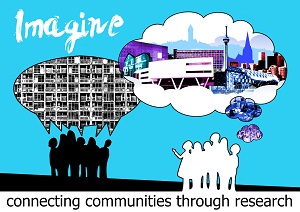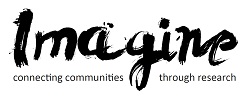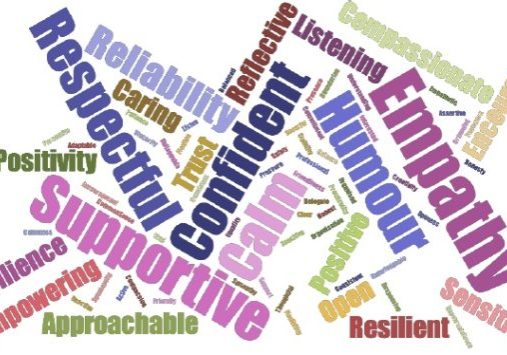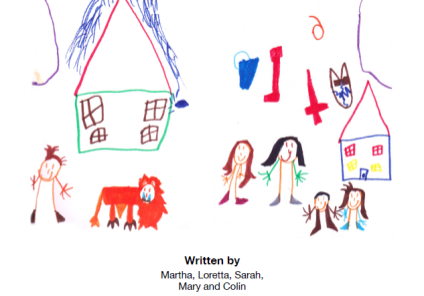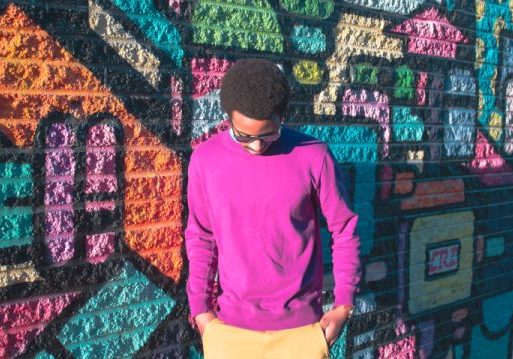The Imagine Programme is a five-year project running from 2013 to 2017 which brings together different research projects working together across universities and their local communities. Using the new knowledge we gather, together we are imagining how communities might be different. We are researching, and experimenting with different forms of community-building that ignite imagination about the future and help to build resilience and a momentum for change. Coordinated by Angie Hart at the University of Brighton, our research group is looking at ‘The social context of civic engagement’ using the concepts of Communities of Practice (CoP), resilience, Community University Partnerships (CUPs), and co-production.
We are demonstrating the potential (or not) for community-university partnerships to bring people from very different backgrounds together to make better and more resilient collective futures. Community partners from Greece, Sweden, England, Germany, Wales and Scotland are working with academics from each of these countries.
The first Imagine Programme project running throughout 2013 and 2014 involves community researchers from Greater Manchester’s Centre for Voluntary Organisation, boingboing, and the Community Partner Network based at the National Coordinating Centre for Public Engagement working alongside academics. We have completed a series of qualitative interviews with community partners and academics to better understand and capture the key elements of resilient community-university partnerships and to understand how community is (or is not) created through them.
The second project from 2014-2016 is using a Communities of Practice approach to frame the study. The CoP approach to CUPs brings people together to develop shared ideas and views on problem-solving, practice and theory development. By working in partnership with others from different settings (for example voluntary, statutory and university sectors), CoPs are particularly valuable for making connections and learning within and between participants from different backgrounds and expertise but sharing a mutual interest. To accommodate social and economic differences, and diverse opinions, a CUP needs to be resilient and take into consideration social context and issues such as inequality, power and voice. Angie and colleagues have used the CoP approach previously and are excited about other people exploring its potential.
The Social Context part of the Imagine Programme is coordinating a range of CUPs in five international sites using a CoP approach to explore ways to build child and family resilience, including the development of resilience in workers and volunteers supporting children or other family members. These CoPs bring together people with very different backgrounds, power statuses and experiences, including parents, young people, practitioners and academics.
Project teams of community organisations and academics are setting up opportunities for people having tough times to learn about resilience-based approaches, and in some cases to try them out. Resilience-based approaches support individuals and communities to navigate stressful and challenging life situations and maintain or develop their well-being in spite of threats to their development.
Boingboing is the lead community partner organisation on this programme, and those involved share a passion for the value of community partner involvement, and other boingboingers have experience using the CoP approach to help achieve lasting joint work that benefits both the university and its community. We are using the CoP approach to bring together different historical learning, cultures and perspectives, to imagine better futures, and consider how to best build the resilience of community-university partnership working for the future.
This is what a couple of people involved in this part of the Imagine Programme are saying about it:
“Boingboing’s resilience-based approaches support individuals to navigate stressful and challenging life situations and maintain their well-being in spite of these threats to their development… So the Imagine project ticks our boxes. We work directly with groups of parents, young people and practitioners to offer information, learning resources and training sessions on the resilience evidence base and ways to weave resilience-building tools into daily practice.” Kim Aumann, Former Co-Director, Boingboing
“Can’t wait to get stuck in with the University of Brighton and friends to find better ways to build child and family resilience. People are really struggling in Greece at the moment and this project is very exciting. It will be great to compare what we’re doing with what goes on in Brighton, Hastings and Scotland too. I told one of our local farmers about the project – she’s got a child with complex needs and they are really struggling financially. We can be quite hierarchical here. So she was a bit worried about being an expert parent in a learning group with her children’s teachers and academics. Still, she said she’d pitch in with some local cheese for a picnic after the first meeting so that should break the ice. People are a bit anxious about working together in what I hear you are calling a ‘democratic learning space’, but they are very enthusiastic.” Dr Maria Georgiadi, Child and Family Development Worker, Diagnostic and Support Centre, Ministry of Education, Rethymno, Crete.
“Not sure we quite get what the overall project is yet coz it all sounds very academic, but that will come with time. We’ve got a good history of positive relationships to build on. The young people from our group really enjoy being involved in previous stuff and get a real sense of ownership from working in partnership with the University of Brighton, and creating their own resources, written in their own words, about resilience and mental health. It has given us a tremendous amount of confidence and has made us feel validated and of value. The work has also helped group members make sense of their own mental health issues and, through the actual process of us being involved, has increased our own resilience. We can’t wait to get involved again. Take a look at what we’ve done already on other things at www.boingboing.org.uk.” Sam Taylor, Art in Mind Project Coordinator, and Lisa Buttery, young person from Art in Mind.
